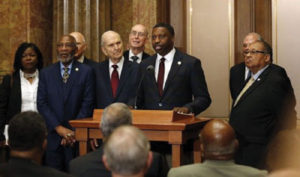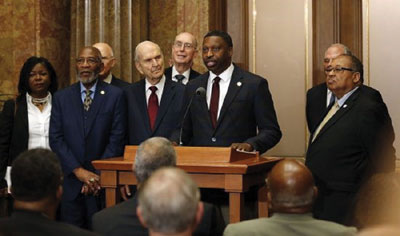 LDS Church, NAACP Leaders hold meeting, issue joint call for Racial Harmony and end to prejudice days after Hoaxer issued an apology for the Church’s Racist History
LDS Church, NAACP Leaders hold meeting, issue joint call for Racial Harmony and end to prejudice days after Hoaxer issued an apology for the Church’s Racist History
NAACP National President Derrick Johnson speaks with President Russell M. Nelson of The Church of Jesus Christ of Latter-day Saints, left, during a press conference in Salt Lake City on Thursday, May 17, 2018. Ravell Call, Deseret News
The presidents of the LDS Church and the NAACP stood together Thursday for the first time and called for an end to prejudice and greater racial and ethnic harmony during a historic news conference at the Church Administration Building near Temple Square.
Black Mormons who attended the event held back tears and hailed the moment as a major step forward.
The two organizations explored how their members can collaborate in areas like education and humanitarian work during a meeting directly before the news conference, said President Russell M. Nelson, the leader of The Church of Jesus Christ of Latter-day Saints, and Derrick Johnson, president of the National Association for the Advancement of Colored People.
“Today, in unity with such capable and impressive leaders as the national officials of the NAACP,” President Nelson said, “we are impressed to call on people of this nation, and indeed, the entire world, to demonstrate greater civility, racial and ethnic harmony and mutual respect.”
Johnson said Thursday’s LDS-NAACP summit — the first time leaders of the church and the civil rights group have met officially — was historic for both organizations. He said the NAACP admired and shared President Nelson’s optimism and looked forward to working with a new partner.
“(The NAACP is) clear that it is our job to speak for those who cannot speak for themselves,” Johnson said. “And we do so through an advocacy voice, but now with a partner who seeks to pursue harmony and civility within our community. I am proud to stand here today, to open up a dialogue, to seek ways of common interest, to work toward a higher pursuit. This is a great opportunity. Thank you for this moment.”
A founding member of the Genesis Group for African American Mormons, organized by LDS apostles in 1971, described the event as a watershed moment.
“I had no idea such a day would come, but come it did, and it’s indicative of the need for all of us to come together and be one,” Darius Gray said. “The challenges of life are too significant to stay in separate corners and not work together. Today marks a milestone. Others will follow.”
Gray said the summit was more significant because it came so close to the official 40th-anniversary celebration on June 1 of the church’s 1978 revelation, which again extended the priesthood to all worthy males.
“Without that event of 40 years ago, today likely would not have occurred,” he said. “Step by step, prayer by prayer, honest effort by honest effort. Thanks be to God.”
NAACP leadership is holding its quarterly national board meetings in Salt Lake City for the first time.
President Nelson stood arm-in-arm with the Rev. Amos C. Brown, a member of the NAACP’s national board, at the start of the news conference. His Twitter account later reflected what he said at the beginning of his comments: “It was my pleasure today to meet with national officials of the NAACP to affirm the fundamental doctrine — and heartfelt conviction — of The Church of Jesus Christ of Latter-day Saints that all people are God’s precious children and are therefore brothers and sisters.”
President Nelson said the church and NAACP began to explore how to work together to lift “our brothers and sisters who need our help, just as the Savior, Jesus Christ, would do.”
“Together we invite all people, organizations and governments to work with greater civility,” he added, “eliminating prejudice of all kinds and focusing more on the many areas and interests that we all have in common. As we lead our people to work cooperatively, we will all achieve the respect, regard and blessings that God seeks for all of his children.”
Cathy Stokes sat on the front row during the news conference and fought back tears as President Nelson quoted Jesus Christ’s command to “be one.”

